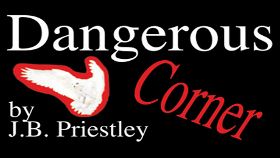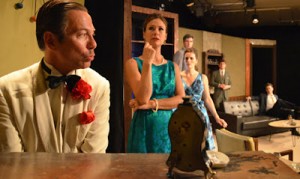GIVE UP THE GHOST AND GIVE US WHAT’S REAL
The multi-hyphenate J.B. Priestley (Author-Novelist-Playwright-Critic-Essayist-Political Commentator) commented, “Comedy, we may say, is society protecting itself – with a smile.” Priestley’s murder-mystery Dangerous Corner revolves around the late Martin Chatfield and the unraveling effect his death has on the intertwined lives of the six people closest to him. However, this sophisticated, suspenseful piece about the fall-out of truth telling and the high price of hedonism becomes a victim of banal inspiration. In Crown City Theatre’s production, co-artistic director Gary Lamb both forwards the 1932 English setting to 1962 Connecticut and makes the audacious choice of bringing the dead, offstage character of Martin Chatfield onstage as a singsong ghost, adversely affecting the otherwise well-presented proceedings. Unfortunately, Lamb’s need to “protect” this production with forced and unnecessary comedy produces dubious, reductive results.
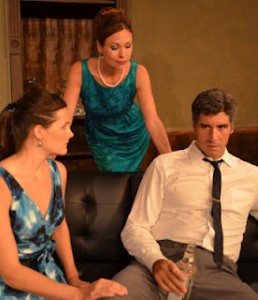 The evening begins at a dinner party’”my apologies’”the show starts with a performance of “That Old Black Magic” sung and played on the upright piano by dapper dead man Martin Chatfield. THEN the evening begins at a dinner party in the country home of Robert and Freda Chatfield, the dead man’s living brother and sister-in-law. All those gathered chatter and banter away innocently until dear friend Olwen Peele notices a cigarette music box that she believes belonged to the departed Martin. From the mystery of the music box’s origins and whereabouts, the present company dive further down a rabbit hole that leads them to question each other’s loyalty, resolve a case of stolen money, and ultimately, discover the true nature of Martin’s death: Was it really a suicide? The liquor pours, the intrigue builds, secrets unfold, and the truth is revealed, leaving the audience to judge for themselves whether it is better to let sleeping dogs lie or wake them up. The piece is well-paced, and at a running time of an hour and fifty-five minutes including an intermission, zips quickly along.
The evening begins at a dinner party’”my apologies’”the show starts with a performance of “That Old Black Magic” sung and played on the upright piano by dapper dead man Martin Chatfield. THEN the evening begins at a dinner party in the country home of Robert and Freda Chatfield, the dead man’s living brother and sister-in-law. All those gathered chatter and banter away innocently until dear friend Olwen Peele notices a cigarette music box that she believes belonged to the departed Martin. From the mystery of the music box’s origins and whereabouts, the present company dive further down a rabbit hole that leads them to question each other’s loyalty, resolve a case of stolen money, and ultimately, discover the true nature of Martin’s death: Was it really a suicide? The liquor pours, the intrigue builds, secrets unfold, and the truth is revealed, leaving the audience to judge for themselves whether it is better to let sleeping dogs lie or wake them up. The piece is well-paced, and at a running time of an hour and fifty-five minutes including an intermission, zips quickly along.
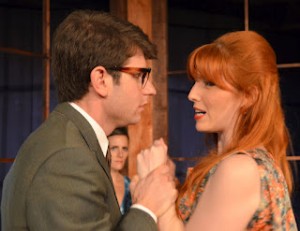 Keiko Moreno’s wonderfully rustic sixties set design is spacious, decked out with modern furniture, and ornamented with nifty era-specific knick-knacks, best of which are a few wall pieces by artist René Magritte that tastefully inform the surreal element of the play. The smart costume design by Tanya Apuya focuses on the muted, pastel side of the palette’”appropriately fitting the broadly colored yet hollow individuals that she clothes. Zad Potter’s light design is adept in creating a haunting and off-kilter atmosphere in the middle of the superficial and smug environment. Nikko Tsiotsias’ sound design is satisfactory, however, the music box melodies (arranged by Co-Artistic Director William A. Reilly) are barely audible.
Keiko Moreno’s wonderfully rustic sixties set design is spacious, decked out with modern furniture, and ornamented with nifty era-specific knick-knacks, best of which are a few wall pieces by artist René Magritte that tastefully inform the surreal element of the play. The smart costume design by Tanya Apuya focuses on the muted, pastel side of the palette’”appropriately fitting the broadly colored yet hollow individuals that she clothes. Zad Potter’s light design is adept in creating a haunting and off-kilter atmosphere in the middle of the superficial and smug environment. Nikko Tsiotsias’ sound design is satisfactory, however, the music box melodies (arranged by Co-Artistic Director William A. Reilly) are barely audible.
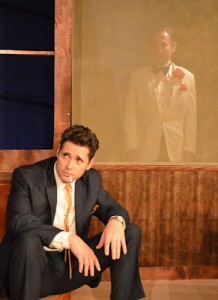 Cortes Alexander (the deceased Martin Chatfield) is a talented singer and piano player, but his work here belongs elsewhere; namely in a revue or lounge act. His appearances veer from garish to downright enraging, as Mr. Lamb chooses to have him emerge during key, climactic moments like an unsavory jack-in-the-box. Moments involving infidelity, sexual assault, and thievery, that should hit with force, become diffused by Alexander’s singing, wide grin, and gesticulations.
Cortes Alexander (the deceased Martin Chatfield) is a talented singer and piano player, but his work here belongs elsewhere; namely in a revue or lounge act. His appearances veer from garish to downright enraging, as Mr. Lamb chooses to have him emerge during key, climactic moments like an unsavory jack-in-the-box. Moments involving infidelity, sexual assault, and thievery, that should hit with force, become diffused by Alexander’s singing, wide grin, and gesticulations.
Matthew J. Williamson gives a strong, full performance as Robert, going from a man full of conviction to slowly losing his hold on purpose and personal fulfillment. Libby Baker is delightfully zesty and acidic as Robert’s wife, and gives the production its biggest, well-earned laughs. Carol Goans as gossip-hungry hack-novelist Maud Mockridge gives her character a much needed earnestness and endearing nature that contrasts well with the other players. Jordan Wall is adequate, yet at times he ventures over-the-top and shrieks too often as Gordon Whitehouse’”effectively robbing his character of the weight and power it wields on the page.
Rachel Amanda Bryant brings full dimension to her character by layering her performance with wonderful choices as Gordon’s wife, Betty Whitehouse, and never misses a beat. Seth Peterson’s Charles Stanton is immediately engaging with his debonair arrogance, and shares the stage well with his fellow players. Tara Bopp’s Olwen Peele is appropriately heartfelt and tortured, but is handicapped by the presence of Alexander’s ghastly, ghostly interference the most.
Unfortunately, the clever and gripping text, the talented ensemble of actors, and an elegantly dressed space are wasted because of Lamb’s disjointed, comic-gothic vision of Priestley’s artful morality play.
photos by Keiko Moreno
Dangerous Corner
Crown City Theatre at St. Matthews Church in North Hollywood
scheduled to close on November 4, 2012
for tickets, go to: http://danger.brownpapertickets.com
